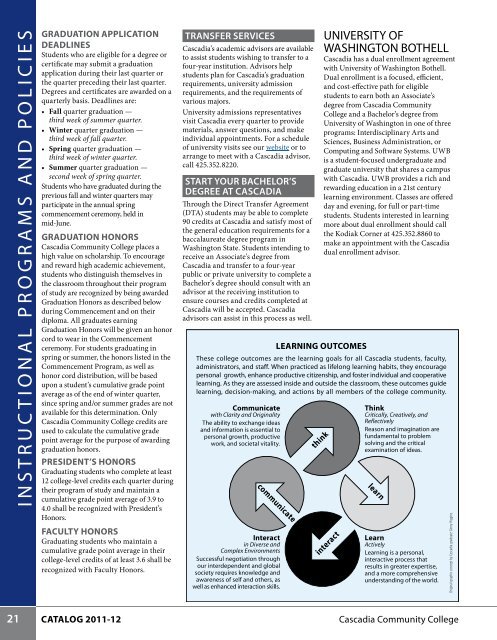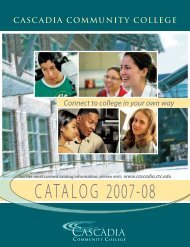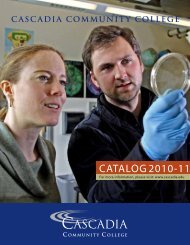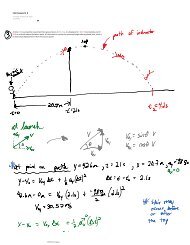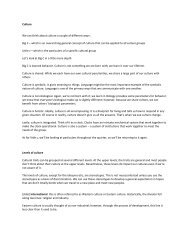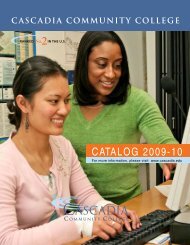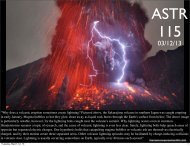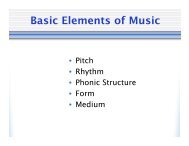2011-12 CATALOG - Cascadia Community College
2011-12 CATALOG - Cascadia Community College
2011-12 CATALOG - Cascadia Community College
You also want an ePaper? Increase the reach of your titles
YUMPU automatically turns print PDFs into web optimized ePapers that Google loves.
Instructional Programs AND Policies<br />
Graduation Application<br />
Deadlines<br />
Students who are eligible for a degree or<br />
certificate may submit a graduation<br />
application during their last quarter or<br />
the quarter preceding their last quarter.<br />
Degrees and certificates are awarded on a<br />
quarterly basis. Deadlines are:<br />
• Fall quarter graduation —<br />
third week of summer quarter.<br />
• Winter quarter graduation —<br />
third week of fall quarter.<br />
• Spring quarter graduation —<br />
third week of winter quarter.<br />
• Summer quarter graduation —<br />
second week of spring quarter.<br />
Students who have graduated during the<br />
previous fall and winter quarters may<br />
participate in the annual spring<br />
commencement ceremony, held in<br />
mid-June.<br />
Graduation Honors<br />
<strong>Cascadia</strong> <strong>Community</strong> <strong>College</strong> places a<br />
high value on scholarship. To encourage<br />
and reward high academic achievement,<br />
students who distinguish themselves in<br />
the classroom throughout their program<br />
of study are recognized by being awarded<br />
Graduation Honors as described below<br />
during Commencement and on their<br />
diploma. All graduates earning<br />
Graduation Honors will be given an honor<br />
cord to wear in the Commencement<br />
ceremony. For students graduating in<br />
spring or summer, the honors listed in the<br />
Commencement Program, as well as<br />
honor cord distribution, will be based<br />
upon a student’s cumulative grade point<br />
average as of the end of winter quarter,<br />
since spring and/or summer grades are not<br />
available for this determination. Only<br />
<strong>Cascadia</strong> <strong>Community</strong> <strong>College</strong> credits are<br />
used to calculate the cumulative grade<br />
point average for the purpose of awarding<br />
graduation honors.<br />
President’s Honors<br />
Graduating students who complete at least<br />
<strong>12</strong> college-level credits each quarter during<br />
their program of study and maintain a<br />
cumulative grade point average of 3.9 to<br />
4.0 shall be recognized with President’s<br />
Honors.<br />
Faculty Honors<br />
Graduating students who maintain a<br />
cumulative grade point average in their<br />
college-level credits of at least 3.6 shall be<br />
recognized with Faculty Honors.<br />
Transfer Services<br />
<strong>Cascadia</strong>’s academic advisors are available<br />
to assist students wishing to transfer to a<br />
four-year institution. Advisors help<br />
students plan for <strong>Cascadia</strong>’s graduation<br />
requirements, university admission<br />
requirements, and the requirements of<br />
various majors.<br />
University admissions representatives<br />
visit <strong>Cascadia</strong> every quarter to provide<br />
materials, answer questions, and make<br />
individual appointments. For a schedule<br />
of university visits see our website or to<br />
arrange to meet with a <strong>Cascadia</strong> advisor,<br />
call 425.352.8220.<br />
Start Your Bachelor’s<br />
Degree at <strong>Cascadia</strong><br />
Through the Direct Transfer Agreement<br />
(DTA) students may be able to complete<br />
90 credits at <strong>Cascadia</strong> and satisfy most of<br />
the general education requirements for a<br />
baccalaureate degree program in<br />
Washington State. Students intending to<br />
receive an Associate’s degree from<br />
<strong>Cascadia</strong> and transfer to a four-year<br />
public or private university to complete a<br />
Bachelor’s degree should consult with an<br />
advisor at the receiving institution to<br />
ensure courses and credits completed at<br />
<strong>Cascadia</strong> will be accepted. <strong>Cascadia</strong><br />
advisors can assist in this process as well.<br />
LEARNING OUTCOMES<br />
University of<br />
Washington Bothell<br />
<strong>Cascadia</strong> has a dual enrollment agreement<br />
with University of Washington Bothell.<br />
Dual enrollment is a focused, efficient,<br />
and cost-effective path for eligible<br />
students to earn both an Associate’s<br />
degree from <strong>Cascadia</strong> <strong>Community</strong><br />
<strong>College</strong> and a Bachelor’s degree from<br />
University of Washington in one of three<br />
programs: Interdisciplinary Arts and<br />
Sciences, Business Administration, or<br />
Computing and Software Systems. UWB<br />
is a student-focused undergraduate and<br />
graduate university that shares a campus<br />
with <strong>Cascadia</strong>. UWB provides a rich and<br />
rewarding education in a 21st century<br />
learning environment. Classes are offered<br />
day and evening, for full or part-time<br />
students. Students interested in learning<br />
more about dual enrollment should call<br />
the Kodiak Corner at 425.352.8860 to<br />
make an appointment with the <strong>Cascadia</strong><br />
dual enrollment advisor.<br />
These college outcomes are the learning goals for all <strong>Cascadia</strong> students, faculty,<br />
administrators, and staff. When practiced as lifelong learning habits, they encourage<br />
personal growth, enhance productive citizenship, and foster individual and cooperative<br />
learning. As they are assessed inside and outside the classroom, these outcomes guide<br />
learning, decision-making, and actions by all members of the college community.<br />
Communicate<br />
with Clarity and Originality<br />
The ability to exchange ideas<br />
and information is essential to<br />
personal growth, productive<br />
work, and societal vitality.<br />
communicate<br />
Interact<br />
in Diverse and<br />
Complex Environments<br />
Successful negotiation through<br />
our interdependent and global<br />
society requires knowledge and<br />
awareness of self and others, as<br />
well as enhanced interaction skills.<br />
think<br />
interact<br />
Think<br />
Critically, Creatively, and<br />
Reflectively<br />
Reason and imagination are<br />
fundamental to problem<br />
solving and the critical<br />
examination of ideas.<br />
learn<br />
Learn<br />
Actively<br />
Learning is a personal,<br />
interactive process that<br />
results in greater expertise,<br />
and a more comprehensive<br />
understanding of the world.<br />
Original graphic concept by <strong>Cascadia</strong> graduate Ginny Higgins.<br />
21 Catalog <strong>2011</strong>-<strong>12</strong> <strong>Cascadia</strong> <strong>Community</strong> <strong>College</strong>


